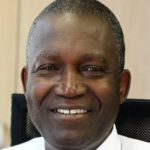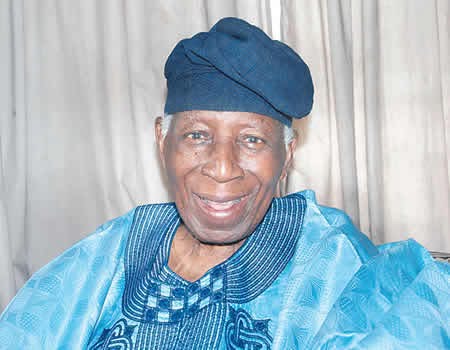It was during the latter part of the 1960s – around 1968 or 1969. There was no mobile phone, no social media. There was the ubiquitous radio that provided news daily. In certain households television was also available.
Despite the absence of social media, people were well-informed about events and people. For example, we were aware that there was a young commissioner in the government of Western State under Governor Adeyinka Adebayo. The young man was known simply as Olunloyo.
He was said to be a talented mathematician. As commissioner for education, he would visit secondary schools and assess their operations. He would reprimand school principals and teachers who were underperforming. He would give instructions on what should be done to improve the school. He would leave as quickly as he appeared. Sometimes, they said, he would drive his vehicle himself to events.
The rumours and stories were many. We were young and happy to know that there was someone at the top who was acting differently from the usual politicians who went around in obvious luxury. The politicians would be accompanied by lorry loads of supporters. The politicians would dance and make lengthy speeches. Once their visits ended and they left, all their promises would disappear with them. Increasingly, the military officers who had replaced the politicians at the time were looking and acting in the traditional mode of political leaders.
Advertisement
Although he was in the military government, Olunloyo was said to be different. He was radical. He was impatient with the politics, convoy of vehicles, supporters, the dancing and speeches. Well, this was the image that many in my generation had of Olunloyo in the 1960s.
Almost 15 years later, I was face-to-face with Dr. Victor Omololu Olunloyo one early morning at his home at Oke Ado, Ibadan.
“Which media organisation are you from?” he asked.
Advertisement
“Me, sir?”
“Yes. You.”
“I am from NAN – News Agency of Nigeria.”
“You don’t have to spell out NAN to me. You think that I don’t know NAN? Ori e o daa. (silly person).” And he laughed. “I like your appearance…smart…tie and nice shirt.”
Advertisement
“Thank you, sir.” I felt good. NAN journalists were required to maintain a smart and formal appearance, conduct themselves in a professional manner, and never accept any form of renumerations or kickbacks from any news source, organization or person.
Olunloyo was the gubernatorial candidate of the National Party of Nigeria (NPN) for Oyo State. I was assigned to cover his and the party’s campaign that was to commence at the time.
The political landscape in 1983 was particularly dynamic. Olunloyo was aiming to unseat the popular incumbent Governor, Bola Ige, known for is eloquence, and a close-ally of Chief Obafemi Awolowo, the leader of the Unity Party of Nigeria, the leading opposition party.
At that time the NPN was led by President Shehu Shagari who held power over federal institutions and security forces which they deployed effectively for the campaign. Conversely, Ige and UPN had a robust party structure in Oyo State, and a long tradition of ruling the state. The state media was effective and highly capable, and firmly under the control of the UPN.
Advertisement
Almost every day, Olunloyo embarked on political campaigns, accompanied with a retinue of vehicles carrying NPN leaders, notably Chief Adisa Akinloye, Chief Richard Akinjide, Chief Lamidi Adedibu, and party cadres. They would travel to towns, villages and small settlements in Oyo State to canvass for votes, visit local leaders and make promises. The reporter’s duty was to file news stories, write feature articles and generally reflect back to the public what happened in the various places.
Olunloyo loved to tell stories. When he was not on the road or campaigning, it was a delight to listen to him. Especially when his party leaders were not in the room, he would lambast every party, including his own. He often recounted tales of corrupt politicians, and how Nigerians were being deprived of their rights, particularly rights to economic development.
Advertisement
One day, we, the media representatives, were gathered as usual in the spacious living area of Olunloyo’s residence. He was telling us stories about how people wanted the NPN in power. How NPN, his party, would triumph in Oyo, Iwo, Iseyin etc. and how Ibadan people would vote himself as their son. A fellow reporter had his notebook out and was scribbling away, capturing the revealing assertions and claims of Olunloyo.
Suddenly, without any prior indication, Olunloyo got up from his chair and seized the reporter’s notebook. He tore it to pieces while saying: “Oniko kuko. O ti le ko ikokuko ju. O ri e o da. (You write all kinds of nonsense. You write too much nonsense. Silly.)”
Advertisement
The he sat down and continued his story as if nothing had happened. The reporter continued to cover the NPN campaign throughout the period with no further incident. Olunloyo did not stop either to provide journalists with information about everything that interested him, including his calculations of how Nigeria could have a democratic government in the long run.
On another day, I arrived early at Olunloyo’s house, ahead of my colleagues. It was not unusual. He had just finished breakfast and he offered me tea.
Advertisement
“No, sir. I have already had breakfast.”
“You NAN people… always proper,” he joked.
“Thank you, sir.”
Then he asked me if I thought that he would be the next governor of Oyo State. I was already familiar with Olunloyo. He did not appreciate pretext or flattery. I gave it to him straight, and told him what I heard around town and my own perspective.
“I do not see yet how you will win this election, sir,” I concluded
“Really?” he queried further.
“This is how I see it,” I held on to my position.
He gazed at me longer than he normally did, and then he said: “Bunmi, listen carefully. There has never been a free and fair election in Nigeria. Go and check the records, go through history. Do the analysis of campaigns, voting, returns and everything involved. This election will not be different.”
I nodded respectfully. I did not quite understand what he meant at the time. In some of our previous conversations, Olunloyo would say things that left me puzzled anyways.
At the end of voting in that election, Olunloyo was victorious and assumed office as governor of Oyo State. He served from October 1983 to December 1983 when General Muhammadu Buhari took over Nigeria in a military coup.
When Olunloyo was declared governor, I was no longer in Ibadan to ask him the question – what made his calculations work as he had predicted?
May his lively, brilliant and vibrant soul rest in peace.
Makinwa is the CEO of AUNIQUEI Communication for Leadership.
Views expressed by contributors are strictly personal and not of TheCable.


